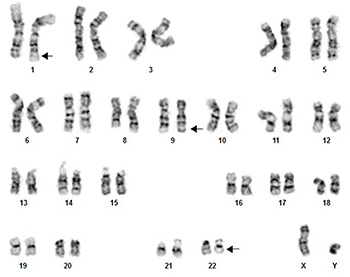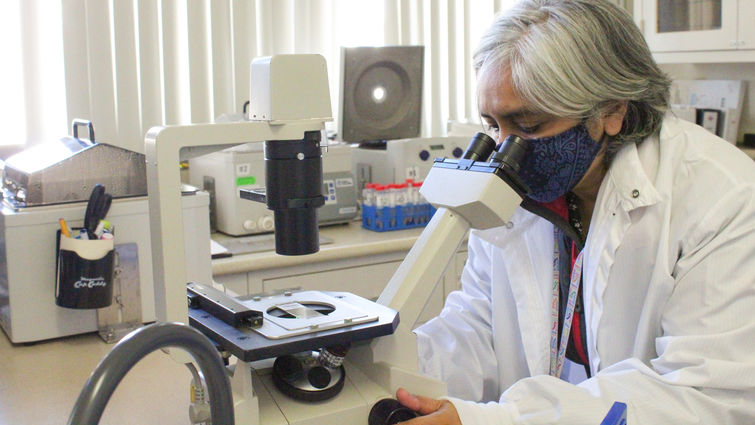

Loma Linda University Health researcher inspects chromosomes under a microscope.
Experts at Loma Linda University Health can detect genetic abnormalities in patients with cancer or suspected of developing cancer, helping care teams reach rapid diagnoses and personalized treatment plans.
“Understanding the genetic makeup of cancer by testing for chromosomal abnormalities allows us to develop a treatment that can be tailored to the individual, rather than administer a standard treatment for a general cancer type,” says Durga P. Cherukuri, PhD, chief of the clinical genetics section in the pathology department at Loma Linda University Health.
At Loma Linda University Health’s molecular cytogenetics laboratory, a multidisciplinary team of experts work together to test patients' blood and bone marrow samples. Physicians receive test results within a week. Cherukuri says results from genetic testing equip care teams with the information necessary for diagnosis, prognosis, and the ability to design the best treatments for their patient.
Blood or bone marrow samples from patients diagnosed with cancer or with symptoms that raise suspicion of cancer, such as pancytopenia or increased white blood cell count, travel to the molecular cytogenetics laboratory. There, Cherukuri’s team runs tests on the samples, searching for indications of blood cancers like leukemia or lymphoma. Experts test for chromosome-related abnormalities in two ways: chromosome analysis testing and fluorescence in situ hybridization, or FISH, testing.

Chromosome analysis aims to identify numerical or structural changes in chromosomes that hold our genetic material. It entails a meticulous process that includes: creating cell cultures from a sample, incubating cells, halting cells in their metaphase stage where chromosomes are most clearly visible, and applying a chemical solution to spread out the chromosomes from each other. A lab technician then applies a stain to the chromosome to reveal their unique patterns of light or dark bands that represent different regions of DNA.
Experts then use software to compare the patterns of light and dark bands between each chromosome pair, on the lookout for instances where sequences diverge and show abnormality. For each patient, experts evaluate 20 sets of 46 chromosomes — in other words, over 900 chromosome pairings.
FISH testing, the other test for detecting chromosomal abnormalities, targets pre-identified abnormalities rather than scanning for all existing abnormalities in a patient’s genome. First, in a denaturation process, experts use very high temperatures to split apart the two strands that make up the DNA spiral. Next, experts apply specific molecules, called probes, to either piece of the original DNA strands that have been split up — launching a process of DNA hybridization that combines complementary single-stranded DNA molecules strands.
Experts can identify specific genetic abnormalities by reading and interpreting color-coded signals that arise after joining up the DNA strands. For a single patient, experts analyze up to 3,000 cells.


“Combining chromosome analysis with FISH testing enables a comprehensive identification of genetic abnormalities in most of these cancerous diseases,” Cherukuri says.
Such results may contain prognostic markers that help care teams assess whether the disease will be stable, progressing, or negatively impacted by treatments. The samples of patients with multiple myeloma, for instance, will undergo both chromosome analysis and plasma cell enriched-FISH testing to gather more insight into the genetic makeup of the patient’s plasma cells. Based on the abnormalities they see, oncologists can determine a multiple myeloma patient’s level of risk — standard, and high — and develop appropriate individualized treatments.
If you don't test this genetic abnormality, you will not give the right drug to the patient.Durga Cherukuri
In addition to measuring a particular cancer's risk, pinpointing chromosomal abnormalities can also help experts predict a patient’s response to targeted therapy. For example, in a patient with chronic myeloid leukemia (CML), Cherukuri may detect an abnormality known as BCR-ABL1 that comes from reciprocal exchange of genetic material between the two chromosomes 9 and 22. This “predictive biomarker" indicates that the patient may respond well to a specific drug called imatinib or several other drugs developed to treat CML.
“If you don't test this genetic abnormality, you will not give the right drug to the patient,” he says.
Last year, the laboratory provided diagnosis, prognosis, or led to individualized therapy for about 600 patients. While the current laboratory is bustling with processing new incoming samples every day, Cherukuri and his team look forward to expanding space and enhancing testing capabilities.
Loma Linda University Health will launch a new section within this laboratory focusing on cancer molecular genetics later this year, allowing experts to detect genetic changes at the DNA or RNA level in addition to chromosomal abnormalities. The new section will also test solid tumor cancers, including lung, breast, and colon cancers.
Genetic testing is critical in every part of human life and medicine, and yields important, even life-saving information for those facing cancer.Durga Cherukuri
Cherukuri says that as the only academic medical center in the Inland Empire region to offer such genetic testing capabilities, Loma Linda University Health will continue impacting clinical education in genetics and shaping the future of the pathological practice. It is also up to Loma Linda University Health to provide care to people in the Inland Empire living with cancers or rare diseases, and who need efficient testing and treatments, he says.
“Genetic testing is critical in every part of human life and medicine, and yields important, even life-saving information for those facing cancer,” Cherukuri says. “We are moving in the right direction by building upon the capabilities we have at Loma Linda University Health.”
This genetic testing laboratory within the department of pathology also serves to support the Loma Linda University Cancer Center. The Cancer Center is dedicated to providing patients with the best opportunity to face and overcome cancer. To learn more about the resources offered to cancer patients at the center, visit its website at lluh.org/cancer-center.
